
The two-week 27th Conference of the Parties of the United Nations Framework Convention on Climate Change (UNFCCC COP27) held in Sharm El Sheikh, Egypt, came to a close on November 19, 2022 with largely unfavorable outcomes for Indigenous Peoples.
The Intergovernmental Panel on Climate Change declared a “code red for humanity” in its most recent report outlining how human activity is altering the planet’s climate in unprecedented and sometimes irreversible ways. Burning of fossil fuels, unsustainable diets, and urbanization are causing climate change, and this is a direct threat to the lives of Indigenous Peoples. Indigenous Peoples are some of the most vulnerable and the first to experience economic and non-economic losses caused by climate change, including loss of livelihoods, displacement, violence, loss of cultures and languages and the holistic impacts on Indigenous Peoples’ identities, ceremonies, and Traditional Knowledge.
Indigenous Peoples hold solutions to climate change mitigation and adaptation, and their deep connection to the land makes them the best experts of their lands. However, Indigenous Peoples are yet to be given a seat at the table and are having to operate in colonial systems that generally refuse to acknowledge the solutions they offer.
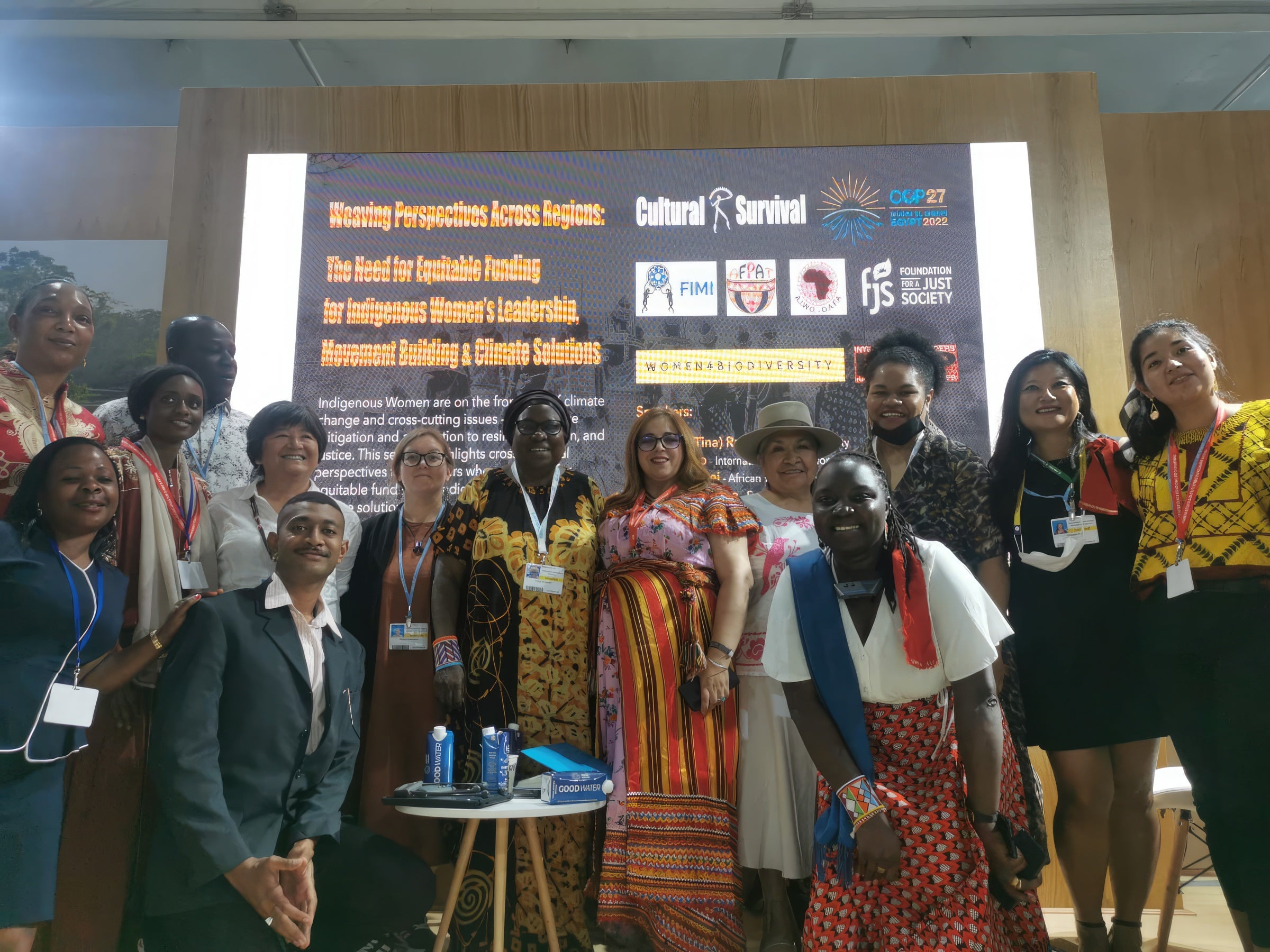
Panelists and attendees at Weaving Perspectives Across Regions: The Need for Equitable Funding for Indigenous Women’s Leadership, Movement Building & Climate Solutions panel.
Monumental Participation of Indigenous Delegates
COP27 was a challenging summit due to the high priced food and accommodation, which limited participation from organizations that are already severely under-resourced. Still, the Indigenous contingency, with more than 300 delegates, was one of the biggest at COP27. Indigenous leaders came to Egypt from every corner of the world to share their stories, show solidarity with each other, and present their solutions for climate change mitigation and adaptation.
The Indigenous Peoples Pavilion, organized by the International Indigenous Peoples’ Forum on Climate Change, hosted over 70 side events by Indigenous delegations from around the world, giving voice to the issues most important to Indigenous Peoples and their communities. The Indigenous Peoples Pavilion made history by having an Indigenous sponsor, NDN Collective, for the first time. Indigenous leaders carried the message, speaking about the need for upholding the rights of Indigenous Peoples in all decisions made, including those related to climate financing and the just transition to a green economy.
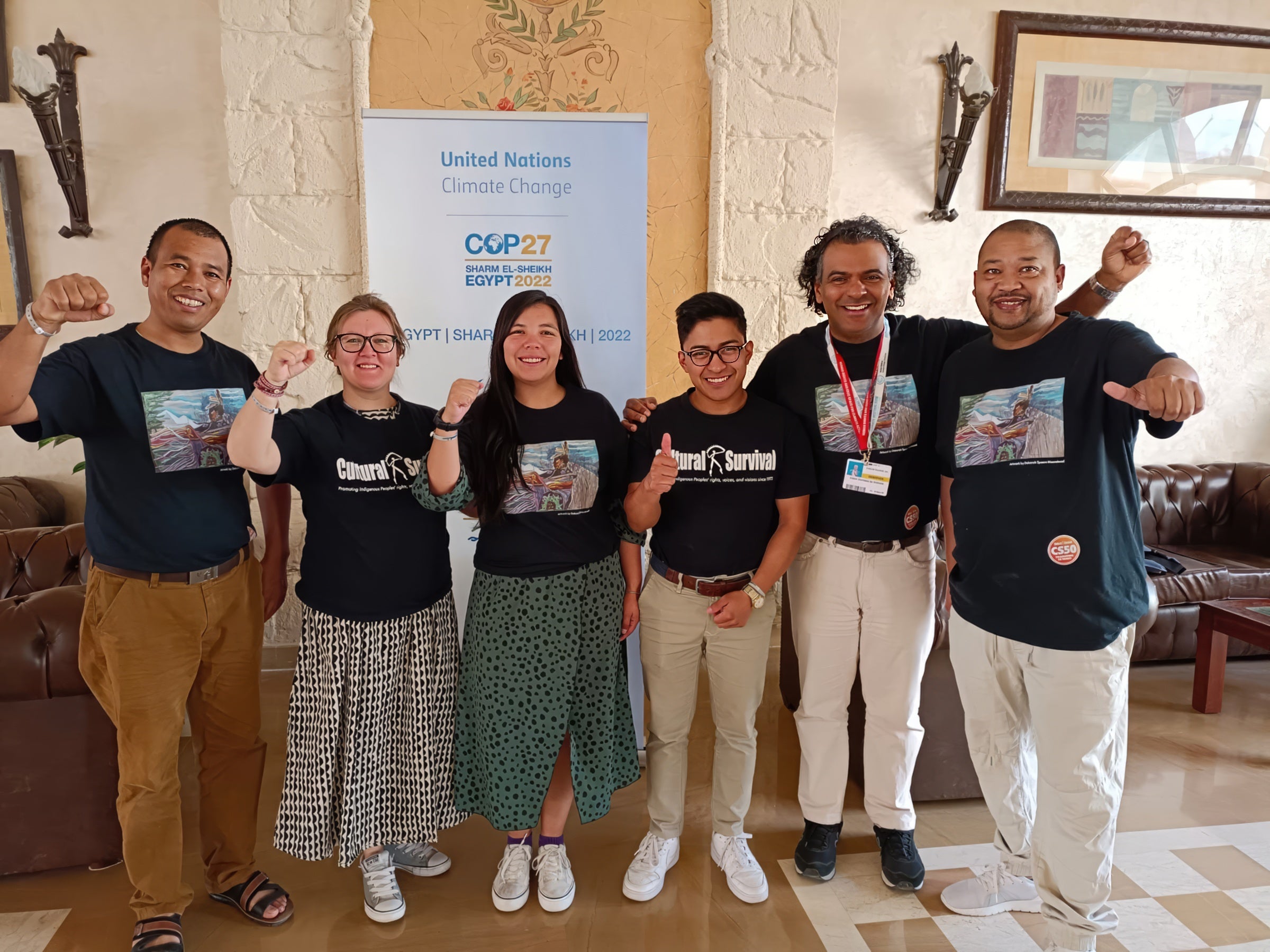
Cultural Survival’s COP27 delegation, L-R: Dev Kumar Sunuwar (Koĩts-Sunuwar), Polina Shulbaeva (Selkup), Lesley Muñoz Rivera (Colla) Bryan Bixcul (Maya Tz’utujil), Edson Krenak Naknnanuk (Krenak), and Shaldon Ferris (Khoisan).
Fossil Fuels Are Here for the Long Run
According to the UN Environment Programme’s Emissions Gap Report 2022, there is no credible pathway to 1.5 ℃ in place. The world is already at more than 1 degree of warming and is on track for more than 2 degrees of warming in the coming decades. The current policies of big polluters are putting the world on a path to climate catastrophe, yet at COP27, as it happened at COP26, reducing the use of fossil fuels was not in the final agreement. (Notably, the oil industry reportedly had around 630 lobbyists present at the summit.)
COP27 failed to establish any true and meaningful agreement on how to get to the root of future problems by reducing fossil fuel consumption. There is only one reference to fossil fuels in the Sharm el-Sheikh Implementation Plan, which calls for “accelerating efforts towards the facedown of unabated coal power and phase out of inefficient fossil fuel subsidies.” The dearth of language on fossil fuels is a slap in the face of the most vulnerable communities already suffering the impacts of climate change.
The Indigenous Peoples’ Forum’s closing statement declared, “The urgency and hopes we heard from world leaders and parties in week one has quickly been overshadowed by false solutions which do not reduce emissions at source—including a reliance on carbon markets, ‘Net Zero’ frameworks, and ‘nature-based solutions’—that delay real reductions, replicate new forms of climate colonialism, and fall short of 1.5 °C. Weak or absent language on human rights, the rights of Indigenous Peoples, and the rights of persons with disabilities in many agenda items, means that this COP has compromised on the uncompromisable. This is evident especially in Article 6 with a rushed conclusion removing many safeguards and references to rights, thus failing to uphold parties’ existing commitments under other agreements such as [the UN Declaration on the Rights of Indigenous Peoples], and leaving our communities at risk of carbon colonialism that further encroaches on our territories and ecosystems.”
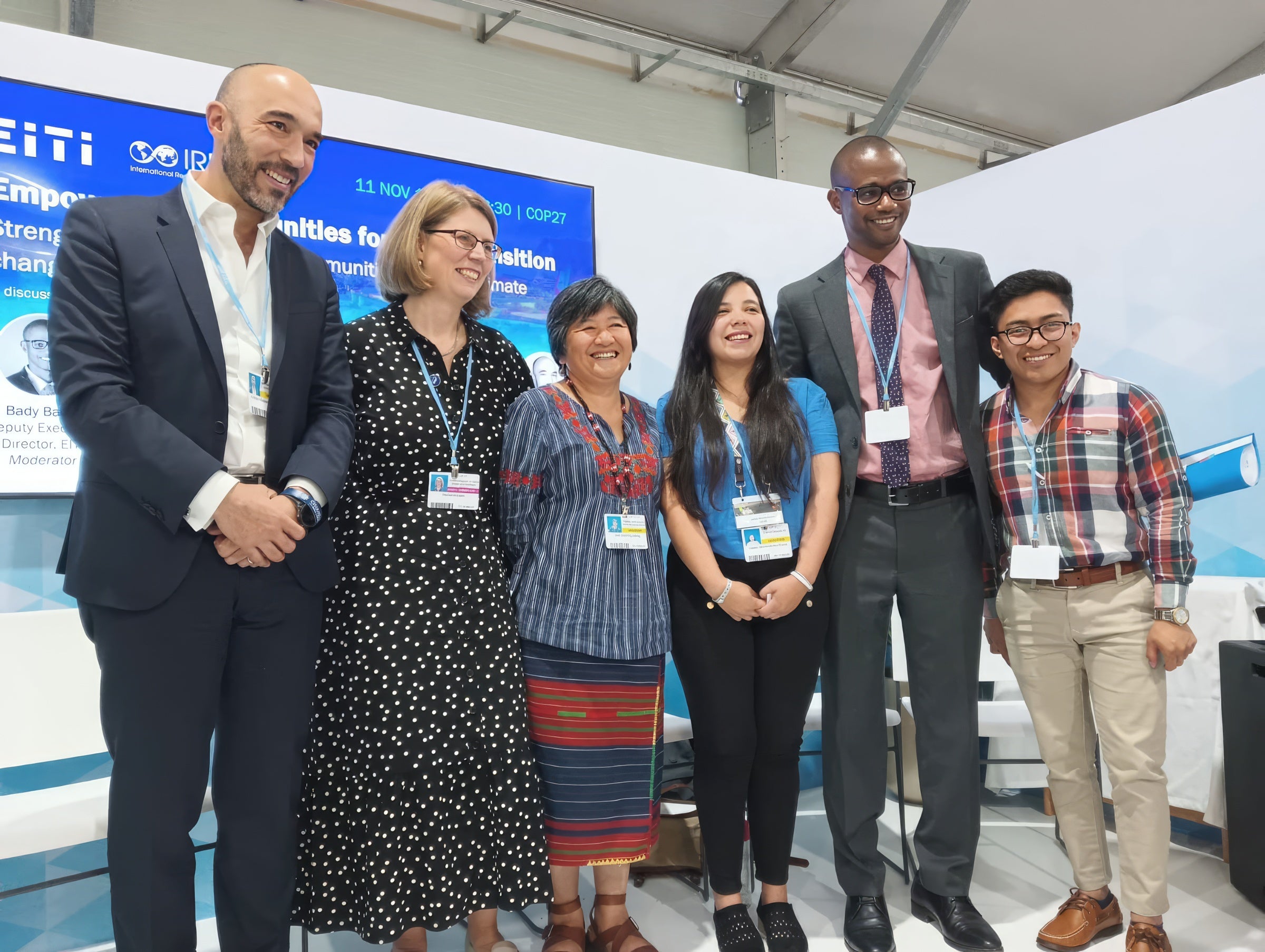
Panelists for Empowering Communities for a Just Transition panel.
Increased Risk of Carbon Colonialism
Regrettably, the sole reference to Indigenous Peoples in the preambular text of the Guidance of the mechanism established by Article 6, paragraph 4 of the Paris Agreement does not do nearly enough to protect the rights of Indigenous Peoples. As noted by the Forum, there was a rushed conclusion that removed many safeguards and references to rights. Indigenous Peoples are totally absent in the operative text, even though many of the world’s major carbon sinks are located on Indigenous Peoples’ territories, which are targeted for “forest conservation schemes” that in many cases have resulted in land dispossession, fortress conservation, and ultimately forced removal of Indigenous Peoples from lands they have stewarded for millennia. Indigenous Peoples and our allies must remain vigilant and keep working to ensure that references to Indigenous Peoples’ rights, including the UN Declaration on the Rights of Indigenous Peoples, are included in the operative text to ensure that rights are not violated by actors looking to profit at the expense of Indigenous Peoples’ knowledge and territories.
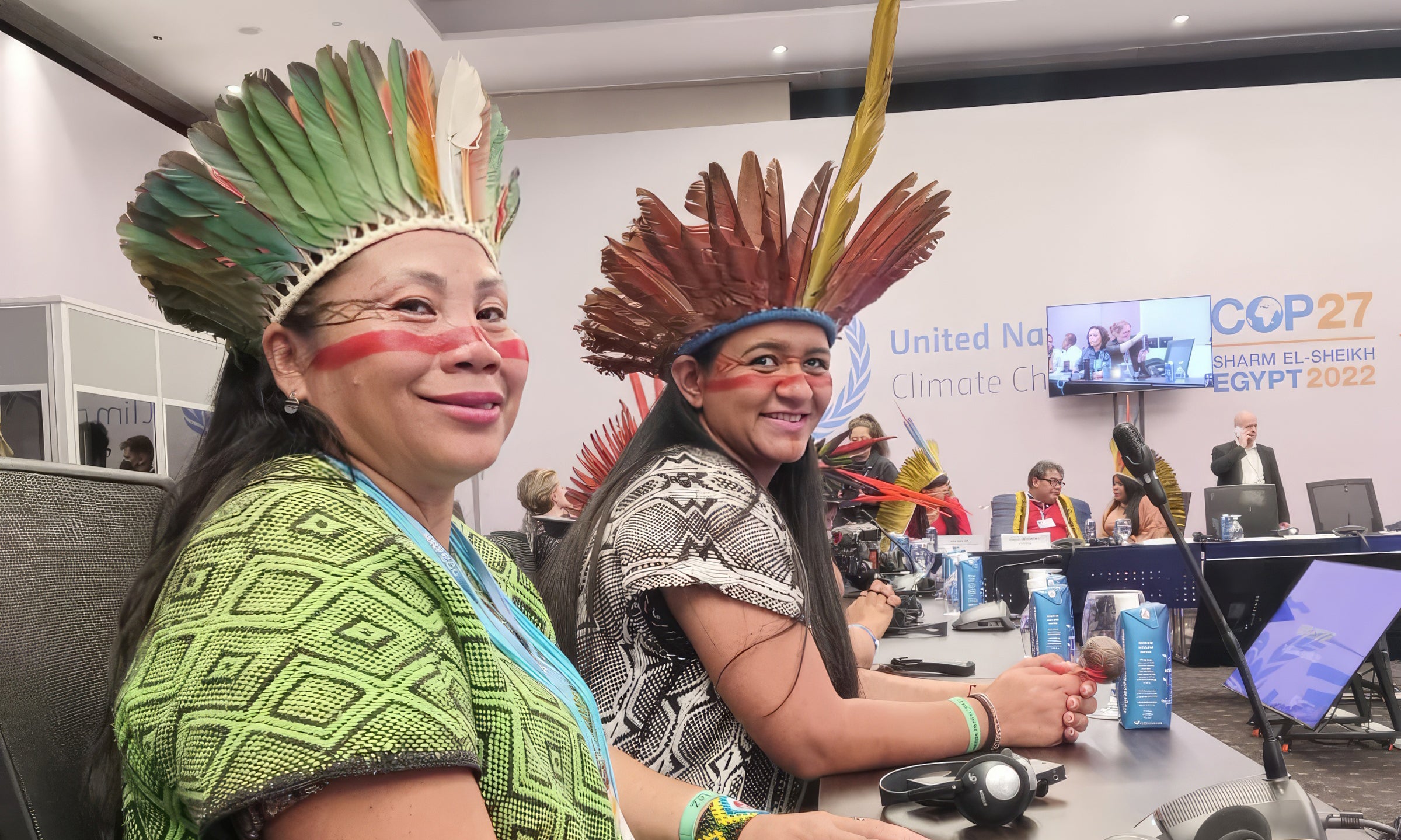
Shirley and Val Hunikuin (Hunikuin), delegates from Coordination of the Indigenous Organizations of the Brazilian Amazon (COIAB).
Unfit Climate Finance Solutions
Many saw the establishment of the new Loss and Damage Fund as a major breakthrough at COP27. However, many questions remain: How will it work? Who’s going to pay? Which countries will get the money? How much money will be available and when? Will it come from governments or also the private sector? A Transitional Committee on the operationalization of the new funding arrangements was established to provide recommendations for the management of this new fund for consideration and adoption at COP28, in Dubai, United Arab Emirates, in 2023. Most concerning is that the final text of the agreement has no references to Indigenous Peoples’ rights, which is especially concerning given that Indigenous Peoples are among the most affected by climate change.
The current climate financial mechanisms sideline the very people stewarding 25 percent of the Earth’s surface, which contains 80 percent of the remaining biodiversity. If the current model for climate financing doesn’t change, actions on loss and damage and climate mitigation and adaptation will not be effective. This is the case of the multi-billion dollar pledges made by philanthropies in partnership with governments in Glasgow in 2021: a recent report published by Forest Tenure Funders Group says that only seven percent of funds from the $1.7 billion pledge made in Glasgow have gone directly to Indigenous Peoples and local communities. Moreover, despite years of advocacy at the Green Climate Fund (GCF), not a single Indigenous-led organization has been accredited or received funding from the Fund. Indigenous Peoples from the seven socio-cultural regions should be at the center of climate finance decisions.
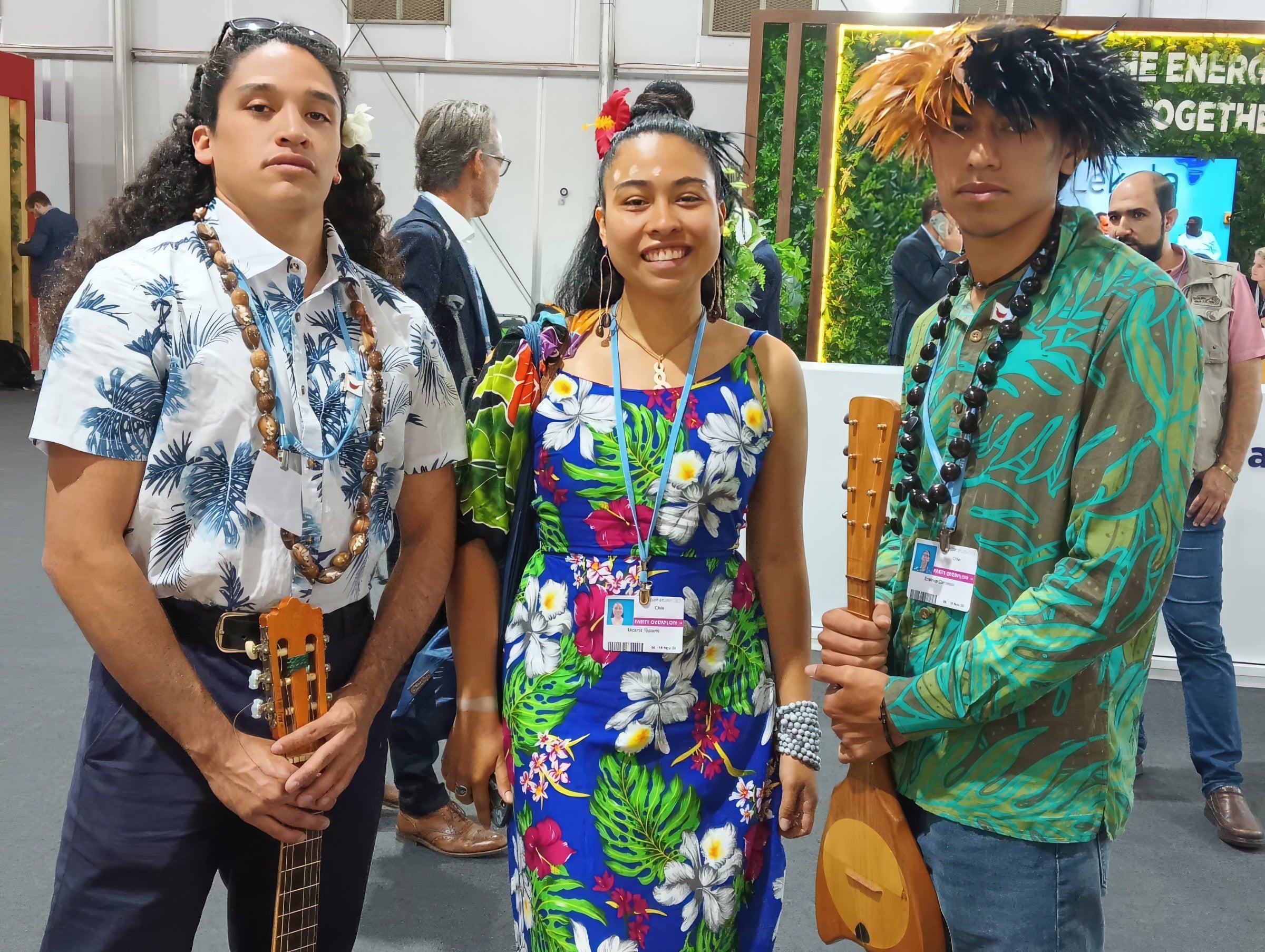
Youth delegates from Rapa Nui.
Developments in Progress
There was no decision reached about The Global Goal on Adaptation at COP27, so the negotiations will continue in 2023. The program for discussions on this topic references Indigenous knowledge, wisdom, and values of Indigenous Peoples, which is a welcome development, and there is hope for more references to the rights of Indigenous Peoples to be included when talks resume. The Global Goal on Adaptation was established in Article 7 of the Paris Agreement with the goal of building up adaptive capacity, strengthening resilience, and reducing vulnerability to climate change.
Indigenous Peoples need to increase their participation at international venues and forums to put more pressure on national governments, big polluters, and international mechanisms to produce real policy reforms that address greenhouse gas emissions and define a proper mechanism for climate finance that actually reaches Indigenous communities while upholding a human rights-based approach and respecting the rights of Indigenous Peoples.
